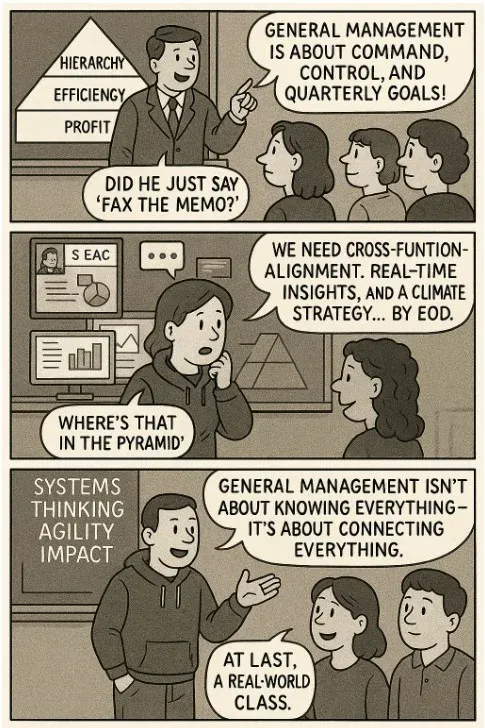The Symphony of Change: Reimagining the Art of General Management

Scene 1: Welcome to the Real MBA
"It’s 2025. In a boardroom in Bangalore, a freshly minted MBA struggles to connect a climate disclosure regulation with her supply chain optimisation plan. Her CFO wants cost cuts. Her COO wants sustainability. But she was never taught how to navigate both."
This wasn’t in the curriculum, but it’s now her career.
Scene 2: The Case of the Empty Toolkit
“In Mumbai, a mid-level product manager stares blankly at her screen. She’s just been handed a mandate to 'build AI into the customer journey'. Her MBA taught her Porter’s Five Forces. Not this.”
While MBA applications are booming, traditional programs feel like old maps for new terrain. They were designed for efficiency, not ambiguity; for clarity, not chaos. The modern manager isn’t just a decision-maker, they are a systems-thinker, a synthesizer, a translator across disciplines.
It’s not necessarily a skills gap. It’s a context gap.
Scene 3: Silos and Swiss Army Knives
“At a global FMCG firm, a marketing VP launches a brilliant campaign… only to find the supply chain can’t deliver. Meanwhile, the operations team is unaware of the campaign altogether.”
General management, when taught in silos, turns leaders into collectors of tools they don’t know how or when to use. Finance. Ops. Strategy. HR. Each is powerful alone, but ineffective if not integrated.
Today’s leaders don’t need toolkits. They need integrated thinking.
Scene 4: The Missing Chapters
“In a Delhi classroom, a bright MBA student asks about ESG metrics. The professor says, 'We’ll cover that in an elective next semester.' But her internship starts next week.”
Where are the topics that shape today’s boardroom conversations? Digital disruption. Climate strategy. Geopolitical shocks. They're not electives, they’re essentials.
A curriculum frozen in time can’t produce leaders who thrive in flux.
Scene 5: Building Transformers, Not Managers
Generalists are the transformers of the business world. Not because they do everything, but because they connect everything. Think Satya Nadella, Indra Nooyi, or even a startup founder wearing ten hats.
Generalists lead with synthesis, not subject matter.
Scene 6: Learning is the New Leadership Signal
“In a review with the board, a CXO gets asked: What have you learned this year?”
The best managers don’t just have answers. They ask better questions. They learn fast. They reinvent often. And they see learning not as a phase, but a permanent posture.
Lifelong learning isn’t a luxury. It’s your competitive edge.
Scene 7: What we have learned at TalentSprint
At TalentSprint, we have spent the last few years working with India’s leading management institutes to co-create what general management should look like next. Here’s what we have learned:
- Early-career? You need exposure and exploration.
- Mid-career? You need cross-functional influence.
- Senior leaders? You need strategy and decision-making in ambiguity.
Change is the only constant. One-size-fits-all doesn’t cut it anymore. Context is the new curriculum.
Rethink General Management. Before the Market Rethinks You.
Management education must evolve, not incrementally, but radically. At TalentSprint, we’re building learning journeys for the new generalist, someone who doesn’t just survive complexity, but thrives in it.
To understand how contemporary programs compare and offer different values, you might find our insights on Executive MBA vs. IIM Programs: Cost & ROI Comparison particularly useful.

TalentSprint
TalentSprint is a leading deep-tech education company. It partners with esteemed academic institutions and global corporations to offer advanced learning programs in deep-tech, management, and emerging technologies. Known for its high-impact programs co-created with think tanks and experts, TalentSprint blends academic expertise with practical industry experience.



